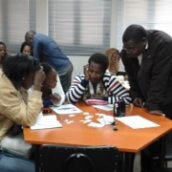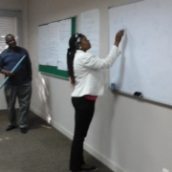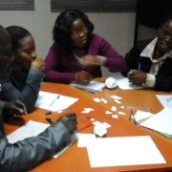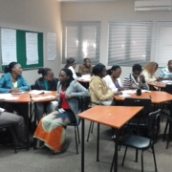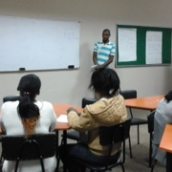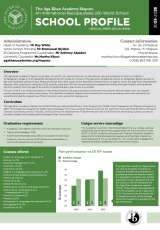Helping Teachers Improve their Teaching
This initiative is being implemented under the umbrella of the PDC’s Monthly Seminars/ Workshop Programme. The expectation is that the participating group of 32 primary school teachers will go on to share their new knowledge, skills and experiences further with other teachers in their schools.
The Early Numeracy and Geometry programme is delivered by the Academy’s PDC once a month on Saturdays in collaboration with Matola Teacher Training College. Eight sessions have been held in 2015, jointly facilitated by two teacher trainers specialized in the Methodology for Teaching Mathematics to Primary School Children.During the sessions, the selected group of teachers share their experiences and knowledge about teaching and learning. They discuss everyday teaching challenges and generate local solutions while enhancing collaboration amongst the group. The Academy strongly believes that these meetings constitute the most appropriate setting to engage teachers in reflective practice and collaborative learning. They also help in building learning communities amongst teachers in Matola and Boane.
In training the teachers, the facilitators employ interactive techniques appropriate for adults that they then link to children’s teaching approaches. This involves all participants in the identification of daily teaching challenges and in the use of problem solving strategies that foster learning.In the first four sessions, the participants dealt with topics related to teaching arithmetic, including procedures for teaching early numeracy and basic mathematical operations such as reading, printing, counting, adding and subtracting. Most recently, teachers learned about teaching early geometry to young learners. This session covered areas such as describing and classifying common shapes and solids, and calculating their perimeter, area and volume.
The teachers will also learn step-by-step procedures to teach addition and subtraction, which will lead to strategies for the development of mental math skills.The rationale behind focusing on early numeracy and geometry stems from the fact that most grade 1 and 2 teachers find it hard to teach early numeracy, and they skip geometry or teach it poorly due to lack of teaching aids or ineffective teacher training.
An additional benefit of the programme has been an emphasis on developing low-cost teaching resources. During the sessions, the facilitators encouraged the participants to use cost-effective and locally available resources, including recycled items (paper or pieces of wood) to craft teaching and learning materials for their students. In line with that, most of the materials used during the sessions consisted of recycled items found in the playgrounds of some of the cooperating schools by the facilitator team.
